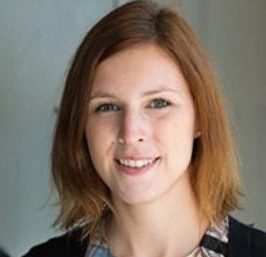“The HD Human Biology Project allows HDSA to foster innovative patient-focused research to help the HD community better understand the biology of HD as it occurs in people. There is nothing more exciting or more relevant to HD than scientific observations made in people with the disease”. – George Yohrling, PhD, Senior Director, Mission and Scientific Affairs at HDSA.
Meet Dr. Sophie Andrews, an HD researcher who was recently awarded HDSA HD Human Biology Project Fellowship. Read about what drew Dr. Andrews to the field of HD research, her passion for her work and how the support of the HD community is critical to advance important research.
What has the grant support from HDSA meant to you?
This funding support from HDSA has allowed me to take the important step from working as a post-doctoral researcher on existing HD projects to taking the lead on my own HD research projects. It is also meaningful to be part of the larger HD research community fostered by HDSA, and I look forward to meeting the other HDSA grant awardees, and the HDSA community more generally while working on this project.
What could the community do to attract more dedicated researchers such as yourself to pursue HD research?
Raising awareness of HD in the general community is important, as this awareness helps researchers consider HD as a potential focus for research, and also encourages larger funding agencies to consider increasing funding allocations to HD research. In addition, community fundraising towards more specialized HD-focused research projects, such as this one offered by HDSA, is also a great way to attract researchers to apply their skills to HD research.
Can you tell us a little about your academic background and how did you get involved in HD research?
I am a Clinical Neuropsychologist, which means I am a psychologist who specializes in the relationship between the brain and cognition. I completed my psychology training and doctoral degree at Monash University in Melbourne, Australia. After graduating from my doctoral program, I worked as a neuropsychologist at a progressive neurology clinic, where I worked with HD patients and developed a passion for HD research. Following this I took a full-time postdoctoral research position, working on the international observational TRACK-HD/TRACK-ON HD studies with Prof Julie Stout. This work inspired me to look for interventions that might slow or prevent symptom progression, and led to my current project focusing on exercise as a potential intervention.
What do you like most about the field of HD research?
I really enjoy working with the HD participants, who are very enthusiastic and generous with their time. I also like the collaborative and international aspects of HD research, many of the studies are worldwide, and it is exciting to collaborate with people with different cultural backgrounds, as well as different professional backgrounds and from different settings. Finally, it is an exciting time to work in HD research, as many promising interventions are being researched and developed, which means that it is a time of great hope for both HD researchers and people with the HD gene.
What is your biggest challenge or struggle in the lab?
Like most research environments, the biggest challenge is making sure there is always enough funding to continue the HD research. However, funding initiatives like this one from HDSA help greatly with making sure HD research continues, even when funding from large government agencies is very limited.
Have you had a mentor that stands out to you? Tell us how he/she has helped you.
One mentor who stands out to me is Prof Julie Stout. Prof Stout is a leading HD researcher, who has been working in HD research for over 20 years on international projects such as Predict-HD, TRACK-HD, and Enroll-HD, and I have learnt so much from her approach and insights on research problems. In addition to being an excellent researcher, she also provides me with encouragement and advice regarding my career, which is so important for an early-career researcher like myself. Finally, she is a role model in the way she provides leadership, listens to and values the insights from everyone around her, and also balances research and family life.
In layman’s terms, please tell us some highlights about your project funded thru the HDSA HD Human Biology Project?
Past research has shown that symptom onset in HD is delayed in people with more active lifestyles. This indicates that exercise is a lifestyle factor with exciting potential to delay symptom progression in HD. Researchers investigating HD in mice have shown that exercise can increase brain plasticity, the brain’s ability to change and adapt, but it is not yet known if the same is true in humans, or what ‘dose’ (intensity) of exercise is optimal. My project is assessing, for the first time, whether high-intensity or moderate-intensity exercise can increase brain plasticity in people who are gene-positive for HD. Before and after a session of exercise on a stationary bicycle, we measure participants’ brain plasticity using a safe, non-invasive and painless way to stimulate the brain called transcranial magnetic stimulation. I am also investigating whether exercise over a number of days can enhance learning abilities.
What is the potential impact of your project on HD research?
The results from this project will be used to provide advice to gene-positive individuals who want to change their lifestyles before symptoms develop, and to design new longer-term lifestyle interventions that are most likely to be effective.
When you are not locked away in the lab, what do you do for fun? Do you have a special talent that most people would not know about you?
I love to travel and learn languages, in fact my first major at university was International Studies, and I speak fluent Norwegian, Swedish, as well as some Spanish and French. When I’m not in the lab or travelling, I spend time with my husband and two mischievous cats.

 Dr. Sophie Andrews
Dr. Sophie Andrews 